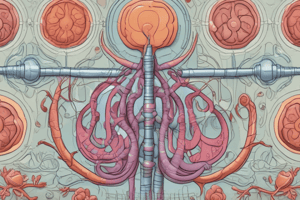Podcast
Questions and Answers
What is the primary symptom of Nephrotic syndrome?
What is the primary symptom of Nephrotic syndrome?
- Edema
- High levels of cholesterol and other lipids in the blood
- Proteinuria (correct)
- Hypoalbuminemia
What is the term for the inflammation of the glomeruli leading to protein leakage from the blood into the urine?
What is the term for the inflammation of the glomeruli leading to protein leakage from the blood into the urine?
- Acute kidney injury
- Pyelonephritis
- Nephrotic syndrome
- Glomerulonephritis (correct)
Which of the following is NOT a primary cause of Nephrotic syndrome?
Which of the following is NOT a primary cause of Nephrotic syndrome?
- Rapidly progressive bronchiolitis (correct)
- Focal segmental glomerulosclerosis
- Minimal change disease
- Diabetic nephropathy
What is the term for the scarring of the glomeruli, which can lead to Nephrotic syndrome?
What is the term for the scarring of the glomeruli, which can lead to Nephrotic syndrome?
Which of the following is a secondary cause of Nephrotic syndrome?
Which of the following is a secondary cause of Nephrotic syndrome?
What is the term for the obstruction of the glomerular capillary lumen by viral antigens?
What is the term for the obstruction of the glomerular capillary lumen by viral antigens?
What is the primary goal of dietary modification in Nephrotic syndrome management?
What is the primary goal of dietary modification in Nephrotic syndrome management?
Which of the following medications is commonly used to treat Nephrotic syndrome?
Which of the following medications is commonly used to treat Nephrotic syndrome?
What is the term for the daily monitoring of fluid intake and output?
What is the term for the daily monitoring of fluid intake and output?
What is the term for the inflammation of the glomeruli, characterized by the deposition of antibodies in their membranes?
What is the term for the inflammation of the glomeruli, characterized by the deposition of antibodies in their membranes?
Flashcards are hidden until you start studying
Study Notes
Renal Failure
- Acute Renal Failure (ARF) is a sudden decline in kidney function, usually reversible.
- Diagnosed using KDIGO criteria (2012): creatinine increase of 0.3 mg/dL in 48 hours, creatinine increase to 1.5 times baseline within last 7 days, urine volume less than 0.5 mL/kg per hour for 6 hours.
- Chronic Renal Failure (CRF) is a persistent impairment of kidney function, often progressive, and may require renal replacement therapy.
Aetiology of Acute Renal Failure
- Prerenal (approximately 60%): hypotension, volume contraction, severe organ failure, NSAIDs, ARBs, ACEI, and cyclosporine.
- Intrarenal (approximately 35%): acute tubule necrosis, acute interstitial nephritis, connective tissue disorders, arteriolar insults, fat emboli, and intrarenal deposition.
- Postrenal (approximately 5%): extrinsic compression, intrinsic obstruction, and decreased function.
Chronic Renal Failure
- Diabetes mellitus, especially type 2, is the most frequent cause of End-Stage Renal Disease (ESRD).
Nephrotic Syndrome
- Inflammation of the glomeruli leading to protein leakage from the blood into the urine (proteinuria).
- Results in low levels of protein (albumin) in the blood (hypoalbuminemia).
- Edema, high levels of cholesterol and other lipids (fats) in the blood (hyperlipidemia).
Causes of Nephrotic Syndrome
- Primary causes: minimal change disease, focal segmental glomerulosclerosis, membranous glomerulonephritis, membranoproliferative glomerulonephritis, and rapidly progressive glomerulonephritis.
- Secondary causes: diabetic nephropathy, systemic lupus erythematosus, syphilis, hepatitis B, Sjögren's syndrome, HIV, amyloidosis, vasculitis, cancer, genetic disorders, and drugs.
Studying That Suits You
Use AI to generate personalized quizzes and flashcards to suit your learning preferences.




